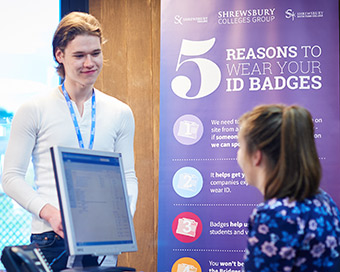The college’s Board of Governors (also known as the Corporation) is responsible for:
- the leadership and oversight of the College – it plays a strategic role; and
- the educational outcome of the College
The main roles and responsibilities (as determined by the Instruments and Articles) are summed up as follows:
- the determination and periodic review of the educational character and mission of the institution and for the oversight of its activities
- approving the quality strategy of the institution
- the effective and efficient use of resources, the solvency of the institution and the Board and for safeguarding their assets
- approving annual estimates of income and expenditure
- the appointment, grading, suspension, dismissal and determination of the pay and conditions of service of the holders of senior posts and the Clerk including, where the Clerk is or is to be appointed as, a member of staff, the Clerk’s appointment, grading, suspension, dismissal and determination of pay in the capacity of a member of staff
- setting a framework for the pay and conditions of service of all other staff.
Other areas that are considered by the Board include:
- Monitoring and evaluating the College's activities and services
- strategic planning of long term issues as well as the short and medium-term
- involvement in the recruitment of senior post holders and the Clerk
- promoting the College (where appropriate)
- assessing the effectiveness of the Board (self-assessment)
- ensuring compliance with legislation and policies adopted by the Board.
All Governors can only be contacted through the Clerk to the Governors - Tracy Cottee by email This email address is being protected from spambots. You need JavaScript enabled to view it. or postal enquiries sent for the Clerk’s attention to:
Shrewsbury Colleges Group
London Road Campus
Shrewsbury
SY2 6PR
Shrewsbury Colleges Group - Exempt Charity Status
Sixth-form college corporations are the legal entities that operate one or more colleges.
The status of the corporation is both:
- a statutory corporation established under the Further and Higher Education Act 1992 (FHEA 1992)
- an exempt charity
Every college has charitable status (for the charitable purpose of advancing education) and so is subject to the requirements of the Charities Act. Further education (FE) corporations and sixth form college (SFC) corporations are classified as 'exempt' charities (Schedule 3 to the Charities Act 2011). An exempt charity has charitable status and is required to comply with charity law, but unlike other charities, they are not regulated by the Charity Commissioners but by a separate regulator – in the case of further education and sixth form corporations, the Department for Education (DfE).
What is a ‘Corporation’?
Colleges operate within a national framework, which is set by legislation and by Government and its agencies.
Every college is under the overall direction of a governing body known as the Corporation. A FE or sixth-form college is an activity through which the corporation achieves its charitable purpose. The college is not a separate legal entity from the corporation. Colleges with statutory corporate bodies have a legal identity that is distinct from the identities of the governors or members. This legal identity facilitates the ability of a college to assume liabilities, rights and duties in its own name.
In Shrewsbury College’s Group’s case, the governing body is a sixth form college corporation established under the Further and Higher Education Act 1992. This Act removed colleges from local authority control and set them up as freestanding public bodies. Corporations are empowered by Section 18 of the Act for the charitable purpose of advancing education.
The Act requires every college to have an Instrument and Articles of Government setting out how it will conduct its business. Schedule 4 to the Act (which was substantially revised by the Education Act of 2011, pages 115 and 116) states what the Instrument and Articles must include.
More information on exempt charities is available here.
This explanation is required under Paragraph 72 of the Office for Students.
Become a Governor
If you would like to know more about the work of the Board and are interested in becoming a governor, please contact the Clerk for more information or complete the enclosed and send to the Clerk at the address above.
Student Governors
Student engagement is vital to the work of the Governing Body when it comes to improving the quality of teaching and learning and the student experience, and indeed wider governance issues in relation to the College. It is the day-to-day practice, people and resources that enable students to be effective and fully involved in relation to the College’s decision making processes.
Student Governors are a vital part of the college’s Learner Voice. They work closely with the Student Council, to ensure the Board is made aware of issues affecting students, and that student experience is an integral part of all the Corporation’s decision-making. Find out more about the role of a Student Governor.
Governors
Policies, Documents & Minutes
Corporation and Committee Organisation and Membership Chart from 4 March 2024.
BOARD Membership = All Governors | ||
FINANCE AND BUSINESS OPERATIONS G Mills (Chair) SLT attendance: Executive Director of Finance |
J. Barratt SLT attendance: Executive Director of Finance | QUALITY STANDARDS AND CURRICULUM A Benghiat SLT attendance: Vice Principal, A Levels |
SEARCH & GOVERNANCE J. Hoyland | REMUNERATION J. Barratt SLT attendance: Vice Principal, People. | |
Governor Links – J. Barratt – Apprenticeships & Careers, R. Harrison - EDI, A. Benghiat – H.E., J. Hoyland – Safeguarding, R. Sartain – H&S, C. Sharp – Audit & Risk
Co-Opted Committee Members – J. Vernon (Quality, Standards & Curriculum Committee and Search and Governance Committee)
Nominees to Radbrook Foundation – R. Sartain and J. Staniforth
The Determination of the Corporation is 19. There is currently 1 vacancy.












